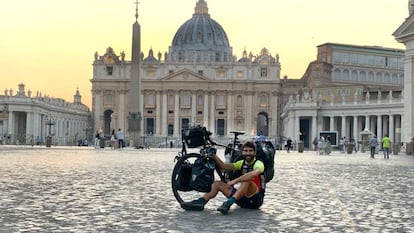The Catalan cyclist who visited 43 countries during the Covid-19 pandemic
An engineer caught by the lockdowns on his way to Singapore instead covered 25,700 km by bike on a European tour that allowed him to compare national attitudes to the coronavirus

About 20 people clap as a weary-looking cyclist pedals into a square in Barcelona. A small banner scrawled with the words “25,700 kilometers and 43 countries” welcomes him home. Nil Cabutí, 30, smiles as his feet touch the ground. It’s December 28 and he’s just finished a 10-month cycling trip through Europe in the midst of the coronavirus pandemic.
Cabutí's original plan had been to travel from the Catalan capital to Singapore, but the pandemic caught up with him a few days into his journey. The day after entering Italy, the country started closing its borders. “It was March and they were stopping all the cars at the police checkpoints, but they didn’t stop me,” he recalls. “The police took a look at me, but they let me go. Every day seemed like it could be the last, that they would send me home.”
His journey became extremely challenging with the general shutdown in the hospitality sector. “I had booked hotels through Booking.com, but when I arrived, they were closed,” he says. “I had already paid, but they told me they couldn’t let me stay. People were afraid of Covid-19.”
He adapted his routine and began to spend the first hour of each day looking for accommodation before starting out. “Only about 10% of places were still open, and I would call them directly,” he says. It wasn’t easy for him to find places to eat in lockdown, either. “One day, a man had to give me some cans of tuna fish and toast at a gas station because Italian supermarkets close on Sundays,” he says. “I couldn’t buy anything!”
Cabutí had been planning to do a big cycling trip for a long time because, as he says, “my two great passions are cycling and traveling.” After seven years working abroad as a civil engineer, he took a sabbatical. “I soon realized that it would be impossible to get to Singapore,” he says. “In Slovenia, things were as bad as in Italy, and in Croatia they wouldn’t let me cross the border at any of the 10 border control points I turned up at.” Foiled at every turn, Asia was quickly ruled out.
Things changed when he headed north towards the Scandinavian countries, which were being praised in Spain at the time as examples of how to manage the public health crisis; the reality, however, was quite different. “In Germany and Switzerland people didn’t even wear masks, and in Sweden all the restaurants were full,” says Cabutí. “It was as if Covid-19 didn’t exist.”
In Sweden, he noted a huge discrepancy between what he was actually seeing and what he was hearing about Sweden on Catalan talk shows. “It was being said that the Swedish were complying with safety measures, but it wasn’t true,” he says. “I was there and people underrated the virus; they thought it was like a flu and that it only affected old people. And on the train they didn’t even take my temperature. Maybe the capacity of their health system allowed them to be more relaxed about it.”
There was also a discrepancy between what he heard about Ukraine and what he actually experienced. “I was told it would be impossible to enter, but I got in,” he says. “You come to realize that everything is relative.”
In Sweden all the restaurants were full. It was as if Covid-19 didn’t exist
The radio was one of his favorite tools for fending off loneliness. “I spent 95% of the trip alone,” he says, adding that he also relied heavily on social media, sharing his experiences on Instagram. In Belarus, technology was a lifeline: “Nobody speaks English! I used screenshots of Google translate to communicate. There were almost no restrictions there.”
According to Cabutí, euros were preferred in Belarus to the local currency. “I got a puncture and the people who helped me asked for euros instead of rubles.”
One of the few times he was stopped by the police was in Paris, on his way back to Catalonia. When the officers asked him to return home, he replied: “I’m already going home.” At that point, he was still more than 1,000 kilometers away, but they let him go.
At the end of the journey, the cyclist considers the trip to have been a bittersweet experience. “I didn’t get to see a lot of things,” he says. “Amsterdam was like a ghost town, and I did the Camino de Santiago [pilgrimage route in Spain] without being able to enjoy the anthropological aspect of it.”
So what’s next? “The trip to Singapore is still pending,” he says. Ideally, when he undertakes it, it will be in a Covid-free world.
English version by Heather Galloway.
Tu suscripción se está usando en otro dispositivo
¿Quieres añadir otro usuario a tu suscripción?
Si continúas leyendo en este dispositivo, no se podrá leer en el otro.
FlechaTu suscripción se está usando en otro dispositivo y solo puedes acceder a EL PAÍS desde un dispositivo a la vez.
Si quieres compartir tu cuenta, cambia tu suscripción a la modalidad Premium, así podrás añadir otro usuario. Cada uno accederá con su propia cuenta de email, lo que os permitirá personalizar vuestra experiencia en EL PAÍS.
¿Tienes una suscripción de empresa? Accede aquí para contratar más cuentas.
En el caso de no saber quién está usando tu cuenta, te recomendamos cambiar tu contraseña aquí.
Si decides continuar compartiendo tu cuenta, este mensaje se mostrará en tu dispositivo y en el de la otra persona que está usando tu cuenta de forma indefinida, afectando a tu experiencia de lectura. Puedes consultar aquí los términos y condiciones de la suscripción digital.









































